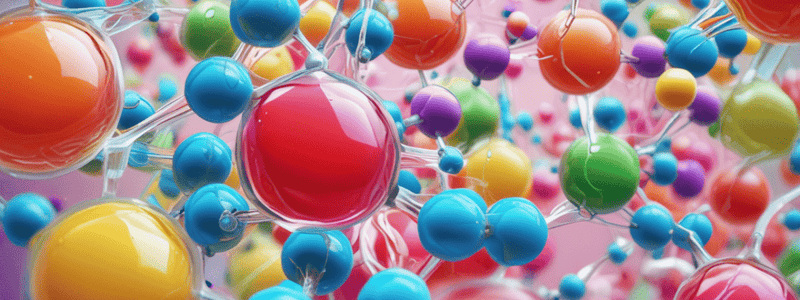Podcast
Questions and Answers
What functional groups are present in carboxylic acids?
What functional groups are present in carboxylic acids?
Carboxyl group (-COOH) and carbonyl group (-C=O)
How do carboxylic acids contribute to the field of organic chemistry?
How do carboxylic acids contribute to the field of organic chemistry?
They serve as building blocks for biologically active molecules and materials like polymers and pharmaceuticals.
What is the primary composition of proteins?
What is the primary composition of proteins?
Amino acids
What determines the unique structure and function of each protein?
What determines the unique structure and function of each protein?
What is the role of proteins in biological systems?
What is the role of proteins in biological systems?
What are the two functional groups present in amino acids?
What are the two functional groups present in amino acids?
How are nucleic acids related to organic chemistry?
How are nucleic acids related to organic chemistry?
What are some examples of materials produced using carboxylic acids?
What are some examples of materials produced using carboxylic acids?
What type of organic compounds contain nucleotides that store genetic information for cellular processes?
What type of organic compounds contain nucleotides that store genetic information for cellular processes?
What are the building blocks for peptides, proteins, and nucleic acids?
What are the building blocks for peptides, proteins, and nucleic acids?
In which type of reactions are diazonium salts formed as intermediates?
In which type of reactions are diazonium salts formed as intermediates?
What is the potential application of diazonium salts in organic synthesis?
What is the potential application of diazonium salts in organic synthesis?
What type of compounds have been synthesized using diazonium salts?
What type of compounds have been synthesized using diazonium salts?
Isocyanides and cyanides are both organic compounds that contain nitrogen atoms bonded to carbon. True or False?
Isocyanides and cyanides are both organic compounds that contain nitrogen atoms bonded to carbon. True or False?
How have isocyanides been used in organic synthesis?
How have isocyanides been used in organic synthesis?
What insights can the study of organic cyanides provide?
What insights can the study of organic cyanides provide?
What significant role do carboxylic acids, biomolecules, diazonium salts, cyanides, and isocyanides play in organic chemistry?
What significant role do carboxylic acids, biomolecules, diazonium salts, cyanides, and isocyanides play in organic chemistry?
How does research advancement impact our understanding of key concepts in organic chemistry?
How does research advancement impact our understanding of key concepts in organic chemistry?
Study Notes
Organic Chemistry: An Overview of Key Concepts
Organic chemistry is the branch of chemistry that deals with the synthesis, isolation, purification, and characterization of organic compounds, which are primarily composed of carbon atoms bonded together with hydrogen atoms. It also involves studying their chemical properties and reactions, and understanding how they interact with various biological systems. Here, we will delve into four specific aspects of organic chemistry: carboxylic acids, biomolecules, diazonia salts, cyanides, and isocyanides.
Carboxylic Acids
Carboxylic acids are an essential class of organic compounds containing a carboxyl group (-COOH) and a carbonyl group (-C=O). They play a crucial role in organic chemistry because they serve as building blocks for many biologically active molecules, including peptides, proteins, nucleic acids, and lipids. Additionally, carboxylic acids are utilized in the production of materials like polymers, pharmaceuticals, and dyes.
Biomolecules: Proteins and Nucleic Acids
Organic chemistry plays a significant role in understanding and synthesizing biomolecules such as proteins and nucleic acids. Proteins are primarily composed of amino acids, which contain both an organic carboxyl group and an amide group (NH-CO). The specific sequence of amino acids determines the unique three-dimensional structure and function of each protein. Nucleic acids, specifically DNA and RNA, also contain organic components made up of nucleotides that store genetic information for cellular processes.
Diazonium Salts
Diazonium salts are intermediates formed during the nitration or halogenation reactions of aromatic compounds containing at least one nitrogen atom on its ring. They have been extensively studied due to their potential applications in organic synthesis, particularly in the formation of carbon-nitrogen bonds through coupling reactions. Diazonium salts have also been utilized in the synthesis of heterocyclic compounds, which are widespread in nature and have diverse biological activities.
Cyanides and Isocyanides
Cyanides and isocyanides are both organic compounds containing nitrogen atoms bonded to one or two carbon atoms. While cyanides are primarily studied in the context of inorganic chemistry, understanding their organic analogues provides insights into their behavior within synthetic routes and biological systems. For example, isocyanides have been used as electrophiles in conjugate addition reactions, providing valuable intermediates in the synthesis of nitrogen-containing heterocycles.
In conclusion, the subtopics of carboxylic acids, biomolecules, diazonium salts, cyanides, and isocyanides all contribute significantly to the field of organic chemistry, offering unique insights into the structure, reactivity, and utility of organic compounds. As research continues to advance, our understanding of these key concepts will continue to evolve, paving the way for new discoveries and innovations in this dynamic field.
Studying That Suits You
Use AI to generate personalized quizzes and flashcards to suit your learning preferences.
Description
Test your knowledge on key concepts in organic chemistry including carboxylic acids, biomolecules, diazonium salts, cyanides, and isocyanides. Explore the essential role these topics play in the synthesis, properties, and functions of organic compounds.




